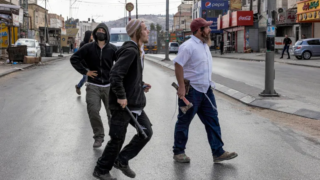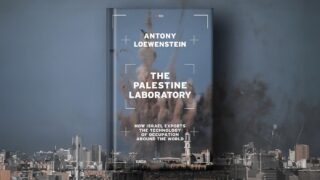
This publication has benefited from the support of the Rosa Luxemburg Foundation. This text may be reproduced in part or in full, provided the source is acknowledged.
The impacts of climate change in the Middle East and North Africa (MENA) region are already a reality and they are undermining the socio-economic and ecological basis of life in the region, which is experiencing recurrent severe heat waves and prolonged droughts, with catastrophic impacts on agriculture and especially on small-scale farmers who are bearing the brunt of the consequences. In the years ahead, the Intergovernmental Panel on Climate Change (IPCC) projects that the Mediterranean region will see an intensification of extreme weather events, such as wildfires and flooding, and further increases in aridity and droughts (1).
The impacts of these changes are disproportionately felt by the marginalized in society, especially small-scale farmers, agro-pastoralists, agricultural labourers and fisherfolk. Already, people are being forced off their lands by stronger and more frequent droughts and winter storms, expanding deserts and rising sea levels (2). Crops are failing and water supplies are dwindling, deeply impacting food production in a region that is chronically dependent on food imports (3). There will be huge pressure on already scarce water supplies due to changes in rainfall and seawater intrusion into groundwater reserves, as well as groundwater overuse. This will place most Arab countries under the absolute water-poverty level of 500 m³ per person per year by 2050 (4).
Climate Change: It’s About Time!
29-12-2022
Climate scientists are predicting that the climate in large parts of the MENA region could change in such a manner that the very survival of its inhabitants will be in jeopardy (5). In North Africa, for example, those whose lives will be changed the most by climate change include the small farmers in the Nile Delta and rural areas in Morocco and Tunisia, the fisherfolk of Jerba and Kerkennah (Tunisia), the inhabitants of In Salah in Algeria, the Saharawi refugees in the Tindouf camps (Algeria), and the millions living in informal settlements in Cairo, Khartoum, Tunis and Casablanca.
The violence of climate change is driven by the choice to keep burning fossil fuels – a choice that is made by corporations and Western governments, together with national ruling classes in the countries of the MENA region. Other major emitters that contribute to climate change are extensive animal farming, deforestation, and unsustainable agriculture, encouraged by Agribusiness.
Energy and climate plans are shaped by authoritarian regimes and their backers in Riyadh, Brussels and Washington DC. Rich local elites collaborate with multinational corporations, and international financial institutions, such as the World Bank, the International Monetary Fund (IMF) and the European Bank for Reconstruction and Development (EBRD). Despite all their promises, the actions of these institutions show that they are the enemies of climate justice and of humanity’s survival.
Conferences of Polluters
Every year, the world’s political leaders, advisers, media and corporate lobbyists gather for another United Nations Climate Conference of the Parties (COP). But despite the threat facing the planet, governments continue to allow carbon emissions to rise and the crisis to escalate. After three decades of what the Swedish environmental activist Greta Thunberg has called ‘blah blah blah’, it has become evident that the climate talks are bankrupt and are failing. They have been hijacked by corporate power and private interests that promote profit-making false solutions, like carbon trading and so-called ‘net-zero’ and ‘nature-based solutions’, instead of forcing industrialized nations and multinationals to reduce carbon emissions and leave fossil fuels in the ground (6).
A green and just transition must fundamentally transform the global economic system, which is not fit for purpose at either the social, ecological or even biological level (as revealed by the Covid-19 pandemic). It must put an end to the colonial relations that still enslave and dispossess people. We must always ask: Who owns what? Who does what? Who wins and who loses? And whose interests are being served?
COP26, held in Glasgow in 2021, attracted massive media attention but achieved no major breakthroughs. The 2022 and 2023 climate talks that were/will be held in the Arab region (COP27 in Egypt and COP28 in the United Arab Emirates) are likewise not expected to achieve much, especially in the context of the intensification of geopolitical rivalries unleashed by the war in Ukraine, a context that is not amenable to cooperation between major powers and which provides yet another pretext for continuing the global addiction to fossil fuels. This could be the final nail in the coffin of global climate talks.
In whose interest? And who bears the costs?
Humanity’s survival depends on both leaving fossil fuels in the ground and adapting to the already changing climate while moving towards renewable energies, sustainable levels of energy use and other social transformations. Billions will be spent on trying to adapt – finding new water sources, restructuring agriculture and changing the crops that are grown, building sea walls to keep the saltwater out, changing the shape and style of cities – and on trying to shift to green sources of energy by building the required infrastructure and investing in green jobs and technology. But whose interest will this adaptation and energy transition serve? And who will be expected to bear the heaviest costs of the climate crisis, and of responses to it?
The same authoritarian and greedy power structures that have contributed to climate change are now shaping the response to it. Their main goal is to protect private interests and to make even greater profits. While international financial institutions such as the World Bank and International Monetary Fund (IMF) are now articulating the need for a climate transition, their vision is of a capitalist and often corporate-led transition, not one led by and for working people. The voices of civil society organizations and social movements are largely unheard when it comes to the implications of this transition and the need for just and democratic alternatives. By contrast, the international financial institutions, alongside the German Agency for International Cooperation (GIZ) and the different European Union (EU) agencies, speak loudly, organizing events and publishing reports in all the countries of the Arab region. They highlight the dangers of a warmer world and argue for urgent action, including using more renewable energy and adaptation plans. However, their analysis of climate change and the needed transition is limited and in fact dangerous as it threatens to reproduce the patterns of dispossession and resource plunder that characterize the prevailing fossil fuel regime.
Most writing on climate change, the ecological crisis and the energy transition in North Africa and the Arab region more broadly is dominated by these international neoliberal institutions. Their analyses are biased and do not include questions of class, race, gender, justice, power or colonial history. Their proposed solutions and prescriptions are market-based, top-down, and do not address the root causes of the climate, ecological, food and energy crises. The knowledge produced by such institutions is profoundly disempowering and overlooks questions of oppression and resistance, focusing largely on the advice of ‘experts’, to the exclusion of voices ‘from below’.
The vision of the future that is pushed by the World Bank, the GIZ, the United States Agency for International Development (USAID), the French Development Agency and much of the EU is one where economies are subjugated to private profit, including through further privatization of water, land, resources, energy – and even the atmosphere. The latest stage in this development includes the public–private partnerships (PPPs) being implemented in every sector in the region, including in renewable energies. The drive towards the privatization of energy and corporate control of the energy transition is global and is not unique to North Africa and the Arab region, but the dynamic is quite advanced here and has so far been met with only limited resistance. Morocco is already advancing along this path, and so is Tunisia. A major push is under way to expand the privatization of the Tunisian renewable energy sector and to give huge incentives to foreign investors to produce green energy in the country, including for export. Tunisian law (modified in 2019) even allows for the use of agricultural land for renewable projects in a country that suffers from acute food dependency (7) (as revealed during the COVID-19 pandemic and again at the time of writing, as war rages in Ukraine).
As developments like this take place across the region, they highlight the importance of asking: ‘Energy for what and for whom?’ ‘Who is the energy transition intended to serve?’ The supposedly ‘green economy’ and the broader mainstream vision of so-called ‘sustainable development’ are being presented by international financial institutions, corporations and governments as a new paradigm. But in reality, this is merely an extension of the existing logics of capital accumulation, commodification and financialization, including of the natural world.
Most writing on climate change, the ecological crisis and the energy transition in the Arab region is dominated by international neoliberal institutions. Their analyses are biased and do not include questions of class, race, gender, justice, power or colonial history. Their proposed solutions and prescriptions are market-based, top-down, and do not address the root causes of the climate, ecological, food and energy crises.
The vision of the future that is pushed by the World Bank, the GIZ, the United States Agency for International Development (USAID), the French Development Agency and much of the EU is one where economies are subjugated to private profit, including through further privatization of water, land, resources, energy – and even the atmosphere.
The historical, political and geophysical realities of the North African region mean that both the effects of and the solutions to the climate crisis there will be distinct from those in other contexts. North Africa was forcibly integrated into the global capitalist economy in a subordinate position: colonial powers influenced or forced North African countries to structure their economies around the extraction and export of resources – usually provided cheaply and in raw form – coupled with the import of high-value industrial goods. The result was large-scale transfer of wealth to the imperial centres, at the expense of local development (8). The persistence till today of such unequal and asymmetric relations reaffirms the role of North African countries as exporters of natural resources, such as oil and gas, and primary commodities that are heavily dependent on water and land, such as monoculture cash crops. This entrenches an outward-looking extractivist economy, exacerbating food dependency and the ecological crisis while maintaining relations of imperialist domination and neocolonial hierarchies (9).
There are therefore crucial questions that need to be raised when talking about addressing climate change and transitioning towards renewable energies in the region: What does a just response to climate change look like here? Does it mean the freedom to move to, and open borders with, Europe? Does it mean the payment of climate debt, restitution and redistribution – by Western governments, by multinational corporations, and by rich local elites? Does it mean a radical break with the capitalist system? What should happen to fossil fuel resources in the region that are currently largely being extracted by Western corporations? Who should control and own renewable energy? What does adapting to a changing climate mean, and who will shape and benefit from it? And who are the key agents and actors that will fight for meaningful change and radical transformation?
Where governments are beginning to take climate change seriously, they are often doing so through a ‘climate security’ lens (10)– bolstering defenses against rising sea levels and extreme weather events, but too often also against the ‘threat’ of climate refugees, and against renegotiations of global power. We need to start looking at the issue of climate change through a justice lens rather than a security one. A future framed around ‘security’ subjugates our struggles to a conceptual and imaginative framework that ultimately re-empowers the state’s repressive power, and securitizes and militarizes the response. More tanks and guns, higher walls and more militarized borders will not solve the climate crisis. At best they will allow the rich to survive in comfort while the rest of the world pays the price for climate inaction. We need to break with the system of capitalist exploitation of people and the planet that has given rise to the climate crisis, not arm and entrench it.
A green and just transition must fundamentally transform the global economic system, which is not fit for purpose at either the social, ecological or even biological level (as revealed by the Covid-19 pandemic). It must put an end to the colonial relations that still enslave and dispossess people. We must always ask: Who owns what? Who does what? Who gets what? Who wins and who loses? And whose interests are being served? Because if we don’t ask these questions we will go straight to a green colonialism, with an acceleration of extraction and exploitation, in the service of a so-called common ‘green agenda’.
The persistence till today of such unequal and asymmetric relations reaffirms the role of North African countries as exporters of natural resources, such as oil and gas, and primary commodities that are heavily dependent on water and land, such as monoculture cash crops. This entrenches an outward-looking extractivist economy, exacerbating food dependency and the ecological crisis while maintaining relations of imperialist domination and neocolonial hierarchies.
The fight for climate justice and a just transition needs to consider the differences in responsibilities and vulnerabilities between North and South. Ecological and climate debt must be paid to countries in the global South, which happen to be the hardest hit by global warming and which have been locked by global capitalism into a system of predatory extractivism. In a global context of forced liberalization and the push for unjust trade deals, as well as an imperial scramble for influence and energy resources, the green transition and talk about sustainability must not become a shiny façade for neocolonial schemes of plunder and domination.
Lebanon: Temperature Rises and Risks Multiply
24-11-2022
Syria: Any Last Survivors?
29-12-2022
In many ways, the climate crisis and the needed green transition offer us a chance to reshape politics. Therefore, the struggle for a just transition and climate justice must be fiercely democratic. It must involve the communities who are most affected, and it must be geared towards providing for the needs of all. It means building a future in which everybody has enough energy, and a clean and safe environment: a future that is in harmony with the revolutionary demands of the African and Arab uprisings: popular sovereignty, bread, freedom and social justice.
The content of this publication is the sole responsibility of Assafir Al-Arabi and Rosa Luxemburg Foundation cannot accept any liability for it.
Researcher and activist Hamza Hamouchene, coordinator of the North Africa program at the Transnational Institute (TNI), was invited to write this introduction as a guest of Assafir Al-Arabi.
1- IPCC (2021) Sixth Assessment Report – Working group 1: The physical science basis. Available at: https://www.ipcc.ch/report/ar6/wg1/
2- Hamouchene, H. and Minio-Paluello, M. (2015) The Coming Revolution in North Africa: The struggle for climate justice [in Arabic and French]. Platform London, Environmental Justice North Africa, Rosa Luxemburg Stiftung, and Ritimo. Arabic version available at: https://www.rosalux.de/en/publication/id/4062/the-coming-revolution-the-fight-for-climate-justice-survival and French version at: https://www.ritimo.org/La-prochaine-re%CC%81volution-en-Afrique-du-Nord-la-lutte-pour-la-justice
3- Amouzai, A. and Kay, S. (2021) ‘Towards a just recovery from the Covid-19 crisis: the urgent struggle for food sovereignty in North Africa’. Transnational Institute and North African Food Sovereignty Network. Available at: https://www.tni.org/en/publication/towards-a-just-recovery-from-the-covid-19-crisis
4- El-Zein, A. et al. (2014) ‘Health and ecological sustainability in the Arab world: a matter of survival’, The Lancet 383(9915): 458–476.
5- Lelieveld, J. et al. (2016) ‘Strongly increasing heat extremes in the Middle East and North Africa (MENA) in the 21st century’, Climatic Change 23.
6- Friends of the Earth International (2021) ‘Chasing carbon unicorns: the deception of carbon markets and “net zero”’. Available at: https://www.foei.org/publication/chasing-unicorns-carbon-markets-net-zero/; Corporate Accountability (2020) ‘Not zero: how “net zero” targets disguise climate inaction’. Available at: https://www.corporateaccountability.org/resources/explainer-not-zero/
7- The Working Group on Food Sovereignty – Tunisia (2019) ‘Our food, our farming, our sovereignty: analysis of Tunisian policies in light of food sovereignty’. [In Arabic]. Available at: https://bit.ly/3CfnHMg.
8- Amin, S. (1990) Delinking: Towards a polycentric world. Zed Books; Amin, S. (2013) The Implosion of Capitalism. Pluto Press. See also Rodney, W. (2012) How Europe Underdeveloped Africa. London: Pambazuka Press; and Galeano, E. (1973) Open Veins of Latin America. New York: Monthly Review Press.
9- Hamouchene, H. (2019) ‘Extractivism and resistance in North Africa’. Transnational Institute. Available at: https://www.tni.org/en/ExtractivismNorthAfrica;
Riahi, L. and Hamouchene, H. (2020) ‘Deep and comprehensive dependency: how a trade agreement with the EU could devastate the Tunisian economy’. Transnational Institute. Available at: https://www.tni.org/en/deep-and-comprehensive-dependency
10- Buxton, N. (2021) ‘A primer on climate security: the dangers of militarising the climate crisis’. Transnational Institute. Available at: https://www.tni.org/en/publication/primer-on-climate-security





